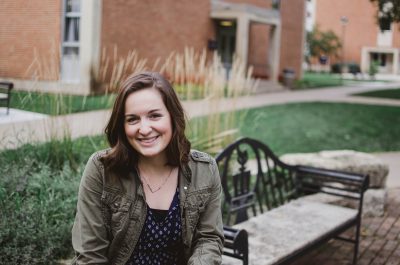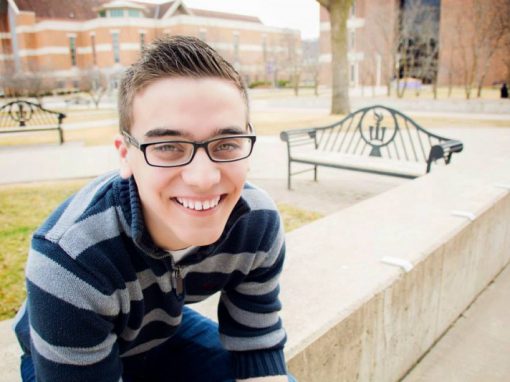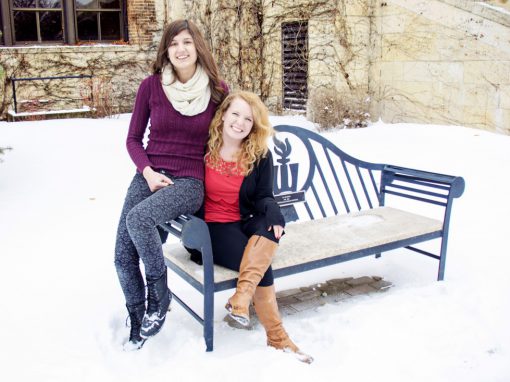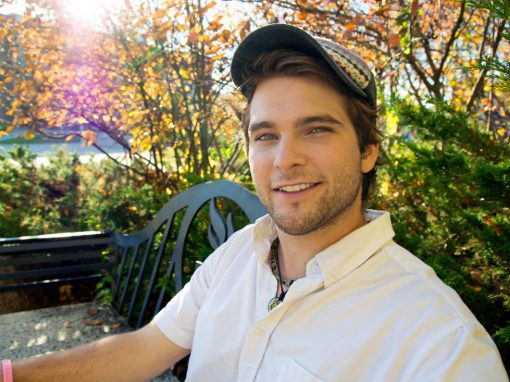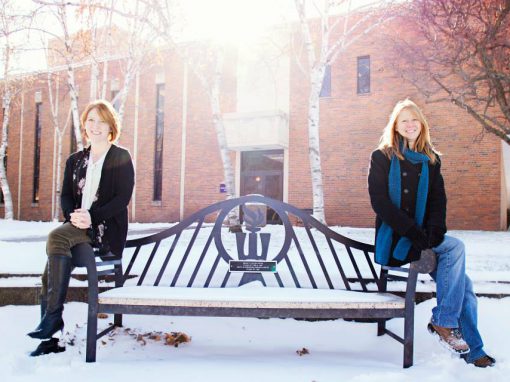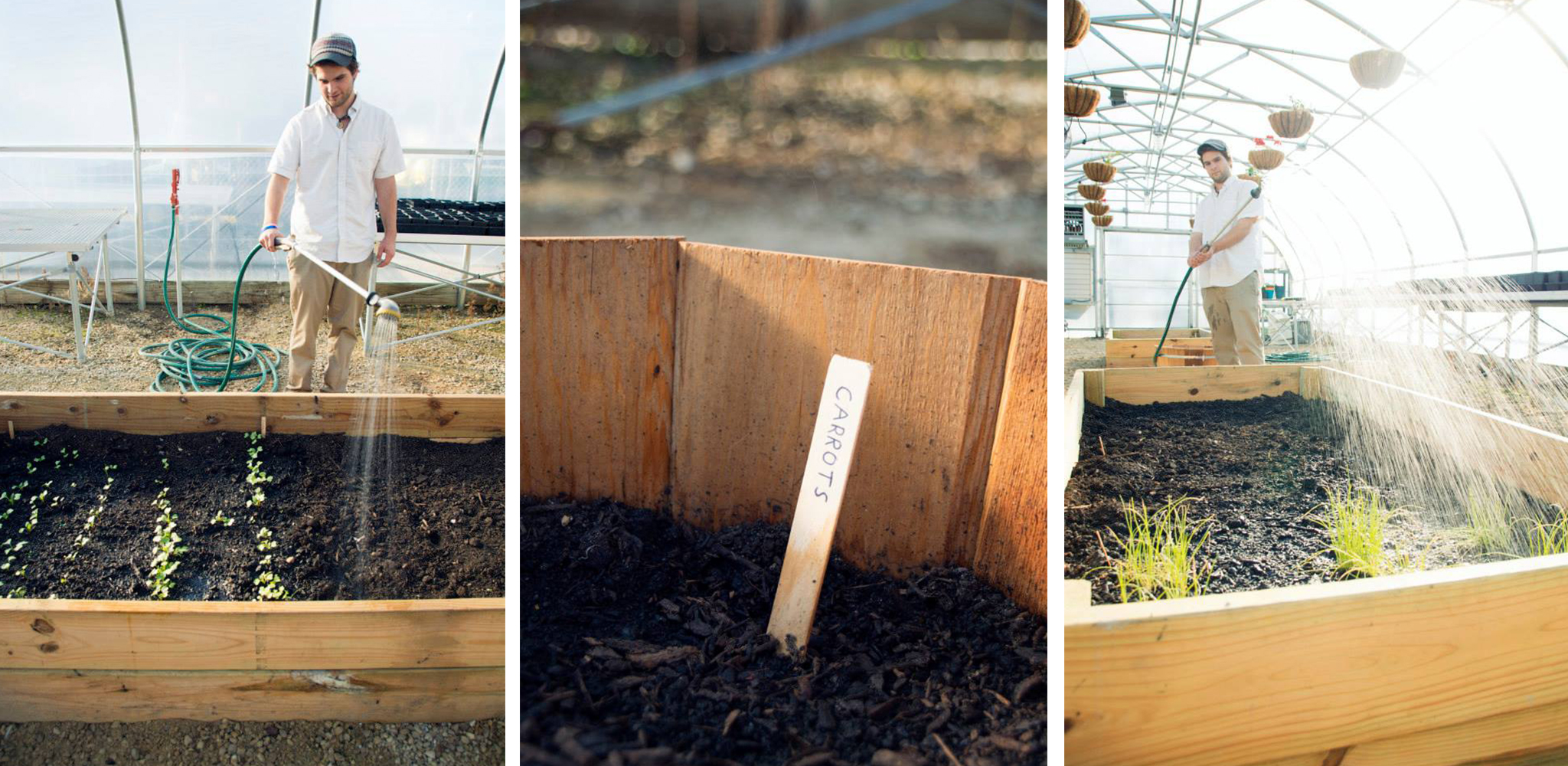
Jay Nelson ’15 | Connecting with the Environment
Student from Hartland, WI
Public Administration and Political Science majors, Spanish and Sustainability minors
“Everyone likes to talk about the “doom and gloom” parts of society such as poverty, hunger and pollution. These problems are easy to highlight, but I’ve always found Environmental Club to be a positive way to address social issues instead of just talking about them.”
Jay Nelson doesn’t look like the Hollywood stereotype of an environmentalist. There’s no dreadlocks, no tie-dye, no hemp jewelry. With his easy smile and charming demeanor, he looks like an average college student at WSU. But when we visited the Greenhouse, his eyes lit up and he excitedly pointed out the little green shoots of squash, beans and tomatoes sprouting in their soil beds—just as you would expect from the leader of the Environmental Club. As we talked, Jay radiated positivity and optimism about where his degrees in public administration and political science, and his passion for sustainability will take him after graduation.
What do you do in Environmental Club?
I’ve been involved in the club since my sophomore year when I declared a sustainability minor and went to all the events and just tried to help out in any way I could. I was elected president of the club my junior year. Now I do all the planning for club meetings and events and finalize our club goals for the year.
What is your favorite part about Environmental Club?
It’s been really cool to see my friends and peers getting involved in projects that we’ve decided are important—not just to the University but to the community too. That’s been really fun to see everybody getting excited about taking part in these projects that we all feel will make the world a better place. It really gives me a sense of purpose and meaning to what I’m doing in my life.
What attracted you to this club?
Everyone likes to talk about the “doom and gloom” parts of society such as poverty, hunger and pollution. These problems that are easy to highlight, but I’ve always found Environmental Club to be a positive way to address social issues instead of just talking about them. There are a lot of ways—for example for our Greenhouse Project and obviously projects like it on a larger scale— you can grow food anywhere, even in urban areas. By setting up an urban farm, you can provide food to people without access to healthy food sources, jobs for people who want to operate a greenhouse, cut down on food waste by utilizing compost systems, and reduce pollution from greenhouse gases produced by large-scale farming. To me, it’s an answer to so many different problems and that has become clear over the past few years.
Can you tell me more about the Greenhouse Project?
The Greenhouse is my proudest achievement so far. A year ago it was a pretty desolate space—just some boxes, garbage cans and random facilities equipment was stored there—and we’ve been able to transform it into this cool place where there’s plants growing and everyone can come take part and learn about growing food or flowers. And you don’t have to be an expert on soil levels or agriculture in order to grow a plant. I’m no expert on growing things, but a year ago my roommates and I experimented growing food in our yard. Our landlord built us a planter and we planted flowers, kale, tomatoes, peppers, squash, lettuce, radishes and cabbage. It all went really well and all we did was stick seeds in the ground and water them.
It just takes trial and error and not being afraid to fail because you learn as you go. The Greenhouse is place for others to try that experiment too, and learn about sustainable agriculture in the process.
Has Environmental Club influenced your career goals?
Definitely. I didn’t have a major when I was a freshman, but now my career goals are to work for an environmental non-profit organization and promote environmental causes. Maybe I’ll even operate greenhouses and work to develop the urban farm movement in some way. My public administration major, especially, has given me the tools to do this sort of work.
After graduation, will you still be involved with volunteering?
Yeah, I’ve looked into some different programs for after graduation and many are based in the non-profit sector. There’s a cool one called GreenCorp where they hook you up with environmental organizations and you learn all about campaigning for environmental causes and educating people through community outreach. I’ve also looked into things like ConservationCorp where you’re in the field doing environmental work.
Who has been the biggest influence in your life?
One of my big influencers now is my advisor Professor Kara Lindaman. She always helps me develop my ideas because I have all these ideas about projects but I can’t ever really zero in on them. So she helps me apply what I’ve learned inside the classroom in the real world. Otherwise I have a friend from high school who has done a lot of work in sustainable agriculture at UW-Madison. I’ve always gone to him for advice or to share stories about how we are each working with sustainability.
If you could invite anyone to sit on this bench and have a conversation, who would it be and what would you talk about?
That’s a tough question… I’ve always thought JFK was an inspiring leader, especially when the country faced really hard times. I’ve read books about him and seen a lot of documentaries and I think he would be someone with some insight about situations when you are faced with a lot of adversity. I would ask him what he does to stay calm under pressure or what he does to be sure to give the best answer when everyone is looking to him.
Interviewed and Edited by Elizabeth Meinders ’15 and photographed by Anna Rae Butler ’15
To nominate someone in the WSU community — faculty, staff, student, alumni or friend of WSU — for Warrior Way, or if you have other feedback to share, please email Mollee Sheehan, director of web communications: msheehan@winona.edu
